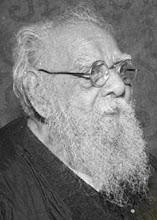Who killed the Imaginative Indian?
Four students return home after their training. On the way, they see the skeletal remains of a lion. Thinking that to be the best opportunity to test their skills, three of them decide to give life to the lion. Now the fourth guy who happens to be dumb at studies, objects. He argues that giving back life to a dead lion would be a rash act and would boomerang on them. The others ignore him. The dumb fellow then proceeds to climb the nearest tree, while the others go ahead and put their skills to test. One of them uses his knowledge to arrange the skeletal remains, over which the next student adds the muscles and tissues. The last one uses his knowledge to breathe life into the lion. The lion on getting to its feet promptly makes a meal of the smart three. The dumbass on the tree looks on sadly.
An entreprenuer uses his money and advertising skills to bring together a group of genetic engineers and paleontologists to recreate a species dead for 65 million years. The lone mathematician in the group objects. He criticises the entrepreneur and the scientists involved for playing with living objects as if they were toys. He predicts that the system would collapse. It does. The mathematician survives to tell the tale.
What do the two stories have in common. The second is the gist of Michael Crichton's Jurrasic Park. The first is a story from Panchatantra by Vishnu Sharma from around 200 BC. Now the claim is not that Crichton flicked the idea from Panchtantra. He most probably does not know about the existence of this work. And neither do I belong to the clan led by Swami Dayanand Saraswathi to make "engineered" claims about India's glorious genetic past. What I find similar and hence interesting is the thought about the dangers of easy knowledge or "off the shelf technology". The aim of the Panchatantra story is most probably to warn about the dangers of text book knowledge not supplemented with common sense. But if the upper layer is slightly ruffled one finds a more important and profound thought coming to fore. That being, the discipline which one should develop along with the technology.
Crichton puts this thought across, through the character of the mathematician Ian Malcolm in Jurassic Park. Scientific power is like "inherited wealth......Most kinds of power require a substantial sacrifice by whoever wants the power. There is an apparenticeship, a discipline lasting many years ...... Whatever it is you seek, you have to give up a lot to get it.............Now what is interesting about this process is that by the time someone has acquired the ability to kill with his bare hands, he has also matured to a point where he won't use it unwisely...."
Crichton gives a very good example of the sort of discipline which science does not foster in the mind of the user.
"A karate master does not kill people with his bare hands. He does not lose his temper and kill his wife. The person who kills is the person who has no discipline.......who has purchased his power in the form of a Saturday night special....."
The Mahabharta provides a simple illustration of the need for discipline which one should develop along with any skill and the dangers, the lack of this control causes. Ashwattama is one of the 3 survivors after the war in the Kaurava army. He vows to destroy the Pandavas and in the figt with Arjuna unleashes the deadly Brahmastra on them. Arjuna counters it with a deadly weapon of his own. But Veda Vyasa intervenes fearing the calamity that the weapons would bring to the land. He advices both the parties to retract the weapons. Now Arjuna, being more disciplined and having mastered the use of weapon the hard way, manages to do it. But Ashwattama was imparted the knowledge of the weapon by Drona, out of affection for him. Ashwattama didn't have the superior discipline which was a necessary condition to handle such weapons. Hence he is not able to call back the weapon. And he is forced to target it onto Uttaraa's womb containing Parakshit who is then brought alive by Krishna(Now that is something which I have always found difficult to digest..but more on that in later posts). But again the point made is that one shouldn't get to use a technology unless one shows the discipine and control required for the proper use of the technology. The Mahabharata example even suggests a need for the ability to outrightly erase the action and not just provide remedies.
While there were men in India atleast 2000 years back, who could think about the risks of technology and could visualise the dangers that accompanies the acquisition of knowledge, the 'Shining Indians' of the present can't even make a decent movie without being unabashedly inspired by some Hollywood movie or novel. This leads to my favourite question,"Who killed the imaginative Indian"...A simplified answer I guess would be a mix of snobbish,opportunistic, spineless and stagnant Brahmins, fanatic Muslim kings, and to top it all the self righteous civilisers from the British Isles who set up an education system to provide them with obedient dubashi clerks, an education system we still have not tried to change.
Labels: Crichton, Mahabharata, Panchatantra


0 Comments:
Post a Comment
<< Home